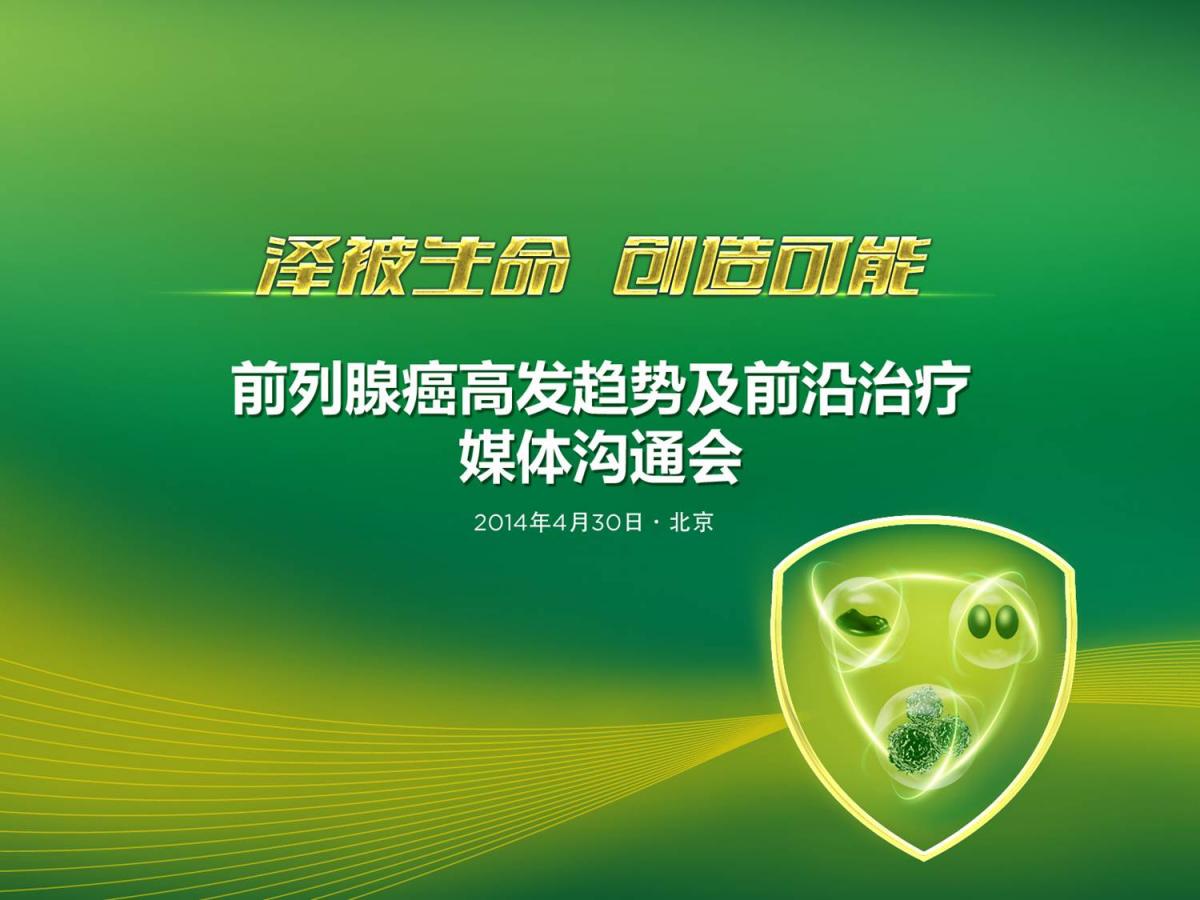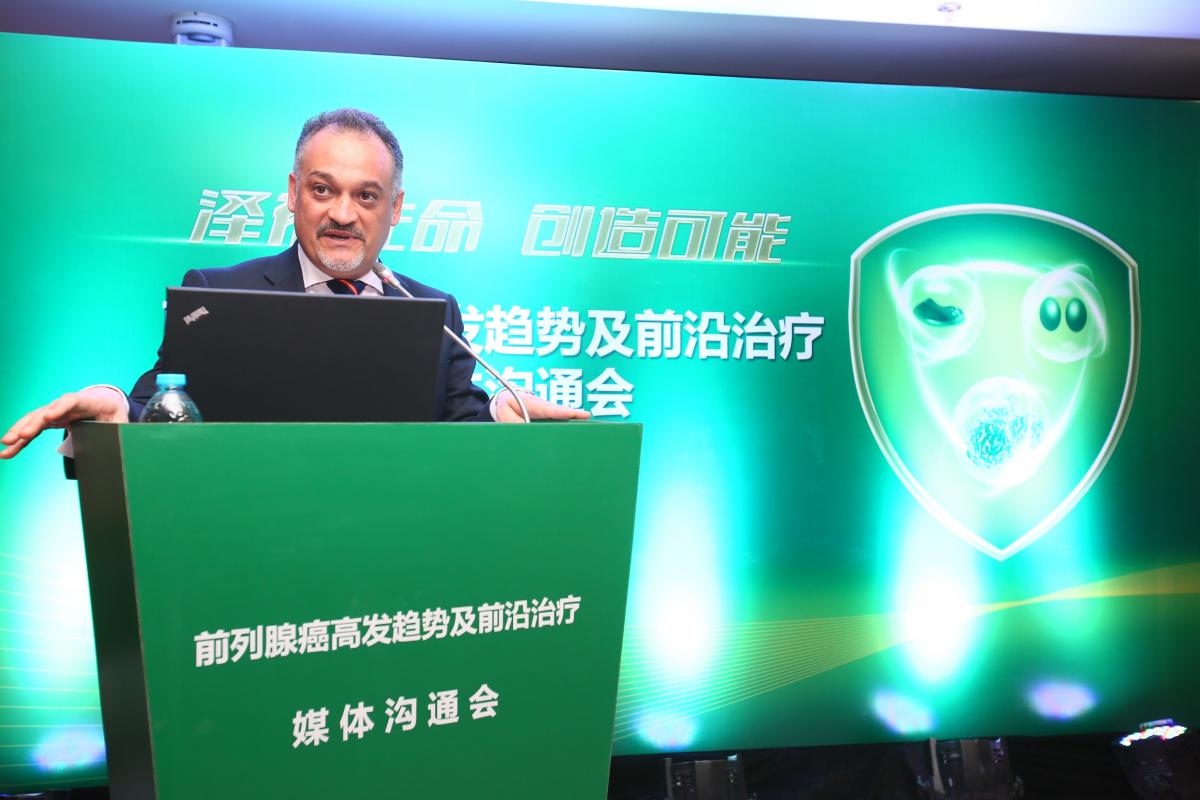?


?“Prostate cancer is the second most common cancer in men worldwide, accounting for almost 15% of new cancer cases, with 1.1 million cases recorded in 20121. Incidence rates in China have risen sharply over the past 10 years, especially in big cities," said Prof. Li Hanzhong, Chairman of the Beijing Urological Association (BUA) of Chinese Medical Association (CMA) and Director of the Department of Urology, Peking Union Medical College Hospital (PUMCH). The number of new patients per year has jumped from 5.53 per 100,000 in 2001 to 16.62 per 100,000 in 2010 in Beijing2, while in Tianjin the incidence of prostate cancer has increased approximately 4 fold over the past 20 years3.
Known as the “silent killer”, prostate cancer is difficult to identify in its early stages. The cancer is often not diagnosed until it reaches an advanced stage, showing symptoms including blood in the urine, painful urination and bone pain. “Advanced-stage prostate cancer is often treated with hormone therapy, also known as androgen-deprivation therapy (ADT). In prostate cancer, male hormones can help fuel tumor growth and ADT reduces their levels to that achieved with castration. Though effective in treating most cases of prostate cancer, ADT does not block all the pathways of the growth of tumors. Therefore, it can alleviate the disease in most patients for only 1.5 to 4 years4,” said Prof. Xu Yong, Chairman of Tianjin Urological Association (TUA) of Chinese Medical Association (CMA) and President of The Second Hospital of Tianjin Medical University. Even with treatment, prostate cancer can develop into a condition called castration-resistant prostate cancer (CRPC), or progress beyond the prostate to other parts of the body such as the bones, which is called metastatic castration-resistant prostate cancer (mCRPC).
Health-related quality of life (HRQoL) deteriorates rapidly in patients with advanced-stage prostate cancer, with patients seriously disturbed by pain, fatigue, sleep disorders and other disease symptoms5. “As concepts of treatment continue to improve, we are now beginning to focus on more than simply prolonging life, but are extending our focus to reducing symptoms and improving patient quality of life,” said Prof. Ma Lulin, Director of the Department of Urology, Peking University Third Hospital.“The treatment of metastatic castration-resistant prostate cancer (mCRPC) has always been a major challenge in the treatment of prostate cancer at its advanced stages. Data shows the average life expectancy of mCRPC patients is no more than 2 years,” said Prof. Zhou Liqun, Director of the Department of Urology, Peking University First Hospital. “However, international study results suggest that further lowering of testosterone levels will help prolong patient survival6. Therefore, fully depriving androgen synthetized by the testis, adrenal gland and cancer itself has become the new focus for the treatment of prostate cancer.”
“A new generation of anti-androgen medication has recently been launched and is widely used abroad. The effectiveness of these drugs in both prolonging life and improving the quality of life of patients has been clinically proven. As these medications are introduced in to China, they will bring new treatment options to China’s mCRPC patients,” said Prof. Li Changling, Director of the Department of Urology, Cancer Institute & Hospital of Chinese Academy of Medical Sciences.“We share with Beijing Urological Association, Tianjin Urological Association and healthcare professionals the common goal of enhancing the quality of life of Chinese prostate cancer patients by improving the effectiveness of treatment,” said Cesar Rodriguez, President of Xian Janssen Pharmaceutical Ltd. “Based on Our Credo and spirit of caring, we will continue to devote ourselves, through innovation and cooperation, to ensuring Chinese patients have access to effective treatment options.”
?
Xian Janssen Pharmaceutical Ltd. is one of the Janssen Pharmaceutical Companies of Johnson & Johnson. It is one of China’s largest pharmaceutical companies and among the earliest multinational pharmaceutical companies to enter China simultaneous with the opening up of China’s economy.
Since its establishment in 1985, Xian Janssen has been committed to providing Chinese patients with high-quality, innovative products that fulfill unmet medical needs in psychiatry, neurology, oncology, immunology, and gastrointestinal and fungal diseases.Based on the company’s Credo and spirit of caring, Xian Janssen has been an active corporate citizen, conducting over 50 cooperative projects in the areas of medicine, public health, medical R&D, and corporate social responsibility.
###
For more information, please contact:
?
Xian Janssen Pharmaceutical Ltd.
Ying DU
Tel: 010-5821 8323
Mobile: 15801387162
Email: ydu11@its.jnj.com
